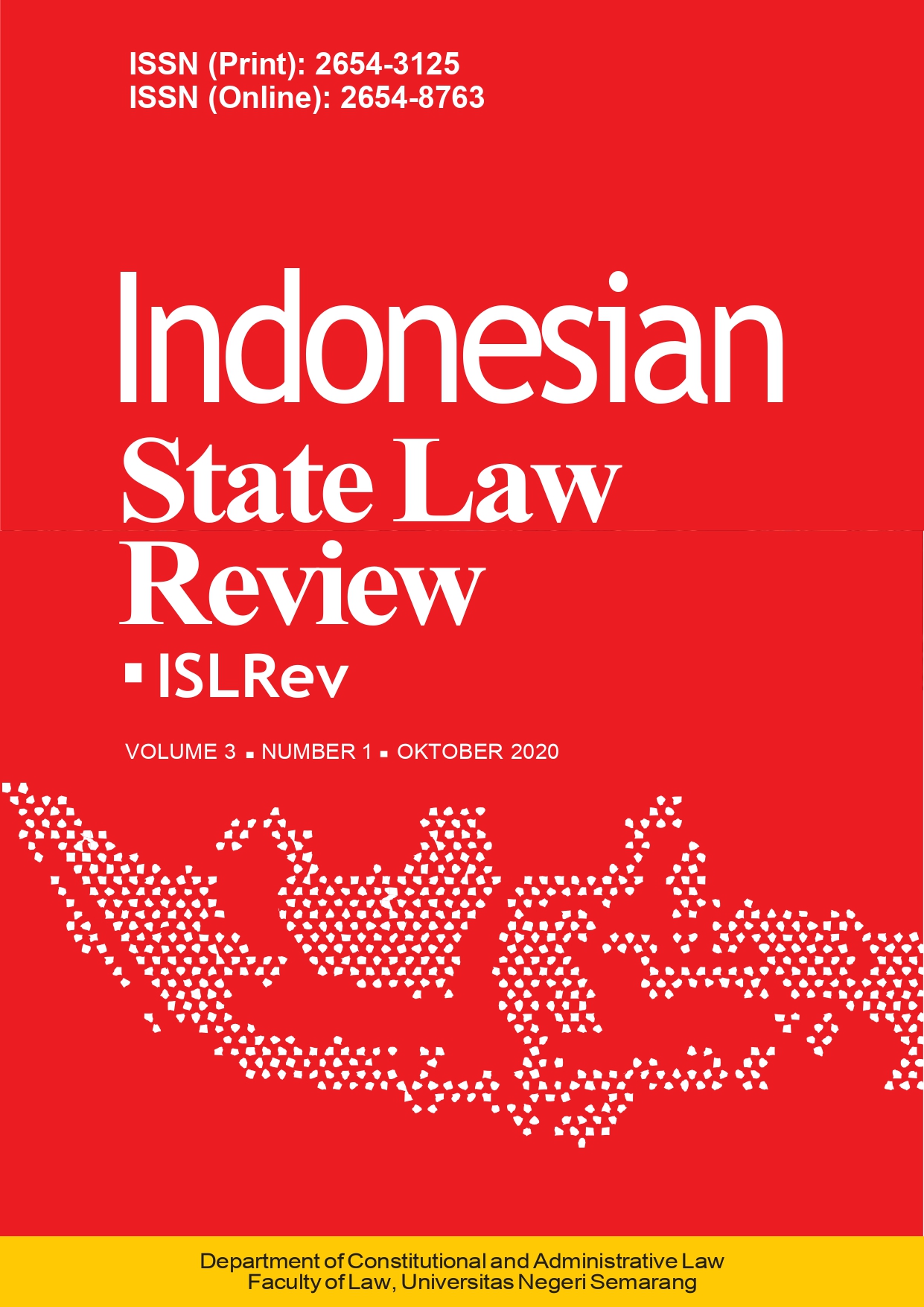UNSYNCHRONIZED IMPACT OF LEGAL REGULATION ON THE LOSS OF STATE’S STANDING FOR THE PREFERENCE RIGHT OF TAX DEBT IN BANKRUPTCY
Main Article Content
Abstract
The state has a preference right (priority) to collect tax debts on goods which belong to the taxpayer (debtor), meaning that the state's position as a preferred creditor is declared to have advance rights to the taxpayer's property to be auctioned in public. Preference rights by the State for paying off tax debts are in fact not as easy as imagined, there are disharmony in several laws and regulations, namely between the Taxation, Bankruptcy and Labor Laws and the Constitutional Court Verdict No.67/PUU-IX /2013 and other problems that affect the State's pre-emptive rights over paying tax debts. The objective of this study is to determine the impact of disharmony of Legal Regulations relating to Debt Repayment in Bankruptcy Against the State's Standing on Preferential Rights of Tax Debt. Based on research, the position of laborers' wages in Constitutional Court Decision No. 67/PUU-XI /2013 contrary to the provisions of the KPKPU Code which regulates labor wages as a bill of general preferred creditors and based on the principle of lex posteriori derogat legi priori, the position of laborers' wages in bankruptcy is based on the provisions of the KPKPU Code which overrides the provisions of Code No. 13 of 2013. Second, the consideration of the Constitutional Court on Verdict No. 67/PUU-XI/2013, is not in same direction with the provisions of the KPKPU Code which regulates that the wages of workers owed both before and after the bankruptcy was declared is a bankruptcy debt.
Article Details
All works published in the Indonesian State Law Review are licensed & copyrighted under a Creative Commons Attribution 4.0 International (CC BY 4.0).
The editorial board of the Indonesian State Law Review shares common vision with Universitas Negeri Semarang as a Publisher in providing unrestricted access to knowledge and education for all and thereby follows Open Access Policy to showcase its content. The Indonesian State Law Review follows open access copyright and licensing policy on the principle that making research freely available to the public supports a greater global exchange of knowledge.
Universitas Negeri Semarang and the Indonesian State Law Review adhere to Creative Commons Attribution 4.0 International (CC BY 4.0) License. The authors submitting and publishing in the Indonesian State Law Review agree to the copyright policy under Creative Commons Attribution 4.0 International (CC BY 4.0). Under this license, the authors published in the Indonesian State Law Review retain the copyright including publishing rights of their scholarly work and agree to let others remix, tweak, and even build upon their work commercially (for academic, scientific, and common purposes). All other authors using the content of the Indonesian State Law Review are required to cite author(s) and publisher in their work.
References
Hartono, Dedy Tri. Perlindungan Hukum Kreditor Berdasarkan Undang-Undang Kepailitan, Jurnal Ilmu Hukum Legal Opinion Edisi I, Volume 4, Tahun 2016,
Ishak, Upaya Hukum Debitor Terhadap Putusan Pailit, Kanun Jurnal Ilmu Hukum No. 65, Th. XVII (April, 2015), pp. 189-215.
Jono, Hukum Kepailitan, Jakarta: Sinar Grafika, 2013
Kiransyah, Riyanda. Analisi Yuridis Kedudukan Kreditor Separatis Terkait Upah Pekerja dari Debitur Pailit (Studi Kasus Putusan Mahkamah Konstitusi Nomor 67/PUU-XI/2013), Jurnal Ilmu Hukum
Kurniawan, Ryan. Harmonisasi Hukum sebagai Perlindungan Hukum bagi Pekerja pada Perusahaan Pailit ditinjau dari Prespektif Pancasila Sila Ke Lima, Jurnal Wawasan Hukum, Universitas Katolik Parahyangan, Vol. 28, No. 01 Februari 2013.
Nasution, Suherman. Tanggung Jawab Direktorat Jenderal Pajak atas Kelalaian mengajaukan Tagihan yang mangakibatkan hilangnya hak mendahului Negara Dalam Kepailitian, USU Law Jurnal, Vol. 6 No. 06, Desember 2018.
Pratiwi, Galuh. Analisis Terhadap Putusan Mahkamah Konstitusi Nomor 67/PUU-XI/2013 atas Kedudukan Pekerja dalam Kepailitian, Magister Ilmu Hukum, Universitas Islam Indonesia, 2017.
Saidi, Muhammad Djafar. Pembaharuan Hukum Pajak, Jakarta: Rajawali Pers, 2014, hlm. 165
Shubhan, M. Hadi. Hukum Kepailitan: Prinsip, norma, dan Praktik di Peradilan, Kencana, Jakarta, 2009
Saliman, Abdul R. Hukum Bisnis Untuk Perusahaan Teori dan Contoh Kasus, Cet.5, Jakarta: Kencana, 2010
Regulations
Undang-Undang Nomor 37 Tahun 2004 tentang Kepailitan dan Penundaan Kewajiban Pembayaran Utang
Undang-Undang Republik Indonesia Nomor 6 Tahun 1983 tentang Ketentuan Umum dan Tata Cara Perpajakan
Website
http://www.suaramerdeka.com/v1/index.php/read/cetak/2013/07/17/231256/Ujimateri-UU-Tenaga-Kerja-Disidangkan, diakses pada 23 Mei 2019.
